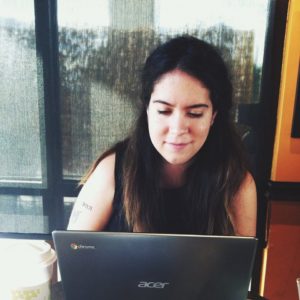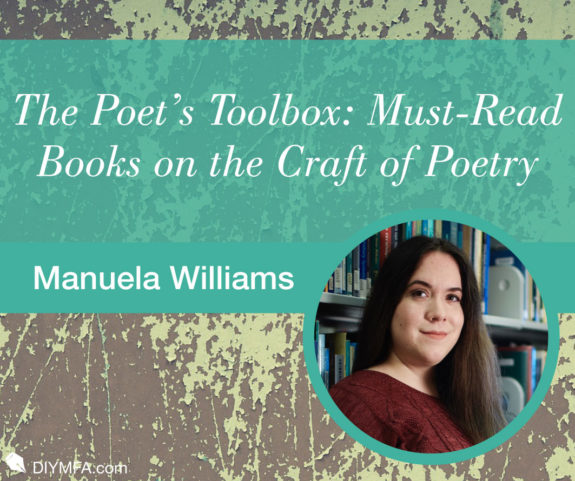Welcome back, poets! I’ve been doing a lot of reflecting as 2021 comes to a close and I head into my final (yay!) semester of grad school. As I read through some of the poetry I wrote at the start of my studies, I’m amazed by how much I’ve learned about the craft of poetry, and also by how much my work has evolved over the course of my grad school career.
To celebrate the almost end of this particular chapter of my life, I thought I’d share some of the books on the craft of poetry that influenced me the most over the past three years in grad school. In compiling this list, I wanted to focus on books that might be useful to brand new poets, as well as anyone looking to brush up on their knowledge.
It was hard to narrow my list down to the five poetry books included below, but I think they offer a great starting place for beginning and experienced poets alike.
1. The Poet’s Companion: A Guide to the Pleasures of Writing Poetry by Kim Addonizio and Dorianne Laux
This was the first book on the craft of poetry I bought as a graduate student and one that I recommend to almost everyone who tells me they’re interested in writing poetry.
When I first started grad school, I quickly realized that I didn’t have a lot of background knowledge on the nuts and bolts of crafting a poem. Sure, I could write poems, but ask me to explain how or why I made certain choices, and I’d be at a loss for words.
Enter The Poet’s Companion. Divided into four parts, Addonizzio and Laux’s book includes chapters on subjects for poems, the craft of poetry, the writing life (including dealing with writer’s block and self-doubt), and a section of writing exercises.
I found the language of The Poet’s Companion to be warm and inviting, which makes this an excellent book for poets who are just starting out. The writing exercises are also very helpful and can be used in the classroom or workshops.
2. A Little Book on Form: An Exploration into the Formal Imagination of Poetry by Robert Hass
Over four hundred pages long, Hass’s Little Book on Form is anything but little. Expansive and covering almost every form imaginable, this book has been an excellent reference to me as I read and attempt to deconstruct and analyze the books on my reading list.
How is a sonnet constructed? How might we analyze a prose poem? What does “scanning” a poem mean? And what the heck is a variable stanza? Hass covers all these subjects and more.
What I really appreciate about this book is that it doesn’t read like a glossary, but more like a conversation. The chapters consist of short, informal “notes” on each form discussed, and I found Hass’s analyses to be especially helpful as I work to develop and hone my own understanding of poetic form and structure.
3. A Beautiful Marsupial Afternoon: New (Soma)Tics by CAConrad
Overwhelmed and looking for reading recommendations in my first semester of grad school, I visited one of my professors and asked for “something different.” CAConrad’s A Beautiful Marsupial Afternoon is one of the books my professor handed me.
I would argue that this book isn’t necessarily a book on the craft of poetry (not like The Poet’s Companion, anyway), however, it is a great book of exercises, and it is deliciously unconventional.
To give you a little taste of the wonderfulness of this book, here’s an excerpt from one of the writing exercises:
“What is the best Love you’ve ever had in this world? Be quiet while thinking about that Love. If someone comes along and starts talking, quietly shoo them away, you’re busy, you’re a poet with a penny in your mouth. . . . Now get your pen and paper and write about POVERTY, write line after line about starvation and deprivation from the voice of one who has been Loved in this world.”
If you’re interested in experimental poetry or are looking for less conventional writing exercises, then CAConrad—and this book—are must-reads.
4. The Ode Less Travelled: Unlocking the Poet Within by Stephen Fry
In his foreword to The Ode Less Travelled, Stephen Fry writes: “I have a dark and dreadful secret. I write poetry.”
So begins a humorous, and very practical, guide to reading and writing poetry. This is another book I like to recommend to beginning poets, as Fry’s tone is incredibly encouraging and easy to understand. Like The Poet’s Companion, there are plenty of writing exercises included throughout the book, however, Fry focuses more on craft elements and form rather than subject matter.
5. Madness, Rack, and Honey: Collected Lectures by Mary Ruefle
I cheated a little by adding this book to the list since it’s technically not a craft book, but Mary Ruefle’s lectures on poetry, literature, and writing are absolutely captivating, and I really enjoyed the inclusion of personal anecdotes, as well as the instructive quality of the lectures.
I actually stumbled upon this book when I was researching witchcraft and poetry, and though Madness, Rack, and Honey is definitely not a book about witchcraft, I think it captures the strangeness and magic of poetry in a way that feels a whole lot like witchcraft.
For instance, check out this beautiful gem from Ruefle’s “Poetry and the Moon”: “I am convinced that the first lyric poem was written at night, and that the moon was witness to the event and that the event was witness to the moon.”
Magical, right?
Conclusion
Back to you, poets!
Tell us in the comments: Are there any books on the craft of poetry I haven’t mentioned here that you’ve found particularly helpful?

Manuela Williams lives and writes in Nevada. She is the author of two poetry chapbooks and one paranormal fiction novella. When she’s not writing, Manuela loves reading romance novels, drinking *all* the coffee, and playing video games.







